The Impact of Media on Juvenile Delinquency: A Research Report
VerifiedAdded on 2021/04/21
|17
|1221
|505
Report
AI Summary
This report investigates the multifaceted relationship between media and juvenile delinquency, exploring how social media and violent content influence youth behavior. It examines the overrepresentation of youth crime in news coverage, the impact of violent video games, and the role of movies and music in shaping young people's attitudes and actions. The report also discusses Bandura's social learning theory and its application in understanding and addressing juvenile crime. Furthermore, it outlines effective prevention strategies, including education and community involvement, while referencing relevant statistics from sources like the National Center for Juvenile Justice (NCVS) and the Office of Juvenile Justice and Delinquency Prevention (OJJDP). The analysis highlights the need for a comprehensive approach to mitigate the negative effects of media and promote positive youth development.

JUVENILE
DELINQUENCY
DELINQUENCY
Paraphrase This Document
Need a fresh take? Get an instant paraphrase of this document with our AI Paraphraser
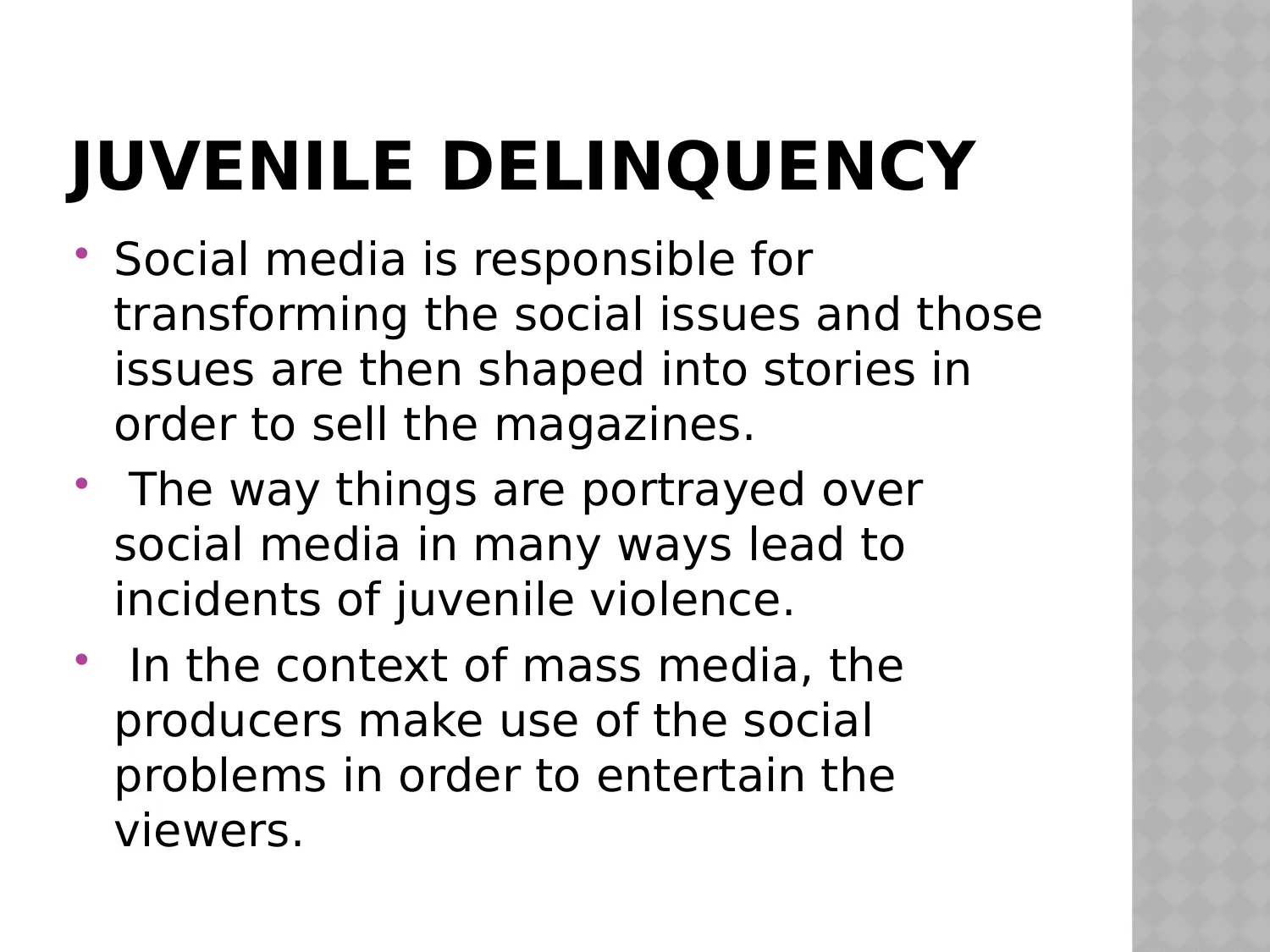
JUVENILE DELINQUENCY
Social media is responsible for
transforming the social issues and those
issues are then shaped into stories in
order to sell the magazines.
The way things are portrayed over
social media in many ways lead to
incidents of juvenile violence.
In the context of mass media, the
producers make use of the social
problems in order to entertain the
viewers.
Social media is responsible for
transforming the social issues and those
issues are then shaped into stories in
order to sell the magazines.
The way things are portrayed over
social media in many ways lead to
incidents of juvenile violence.
In the context of mass media, the
producers make use of the social
problems in order to entertain the
viewers.
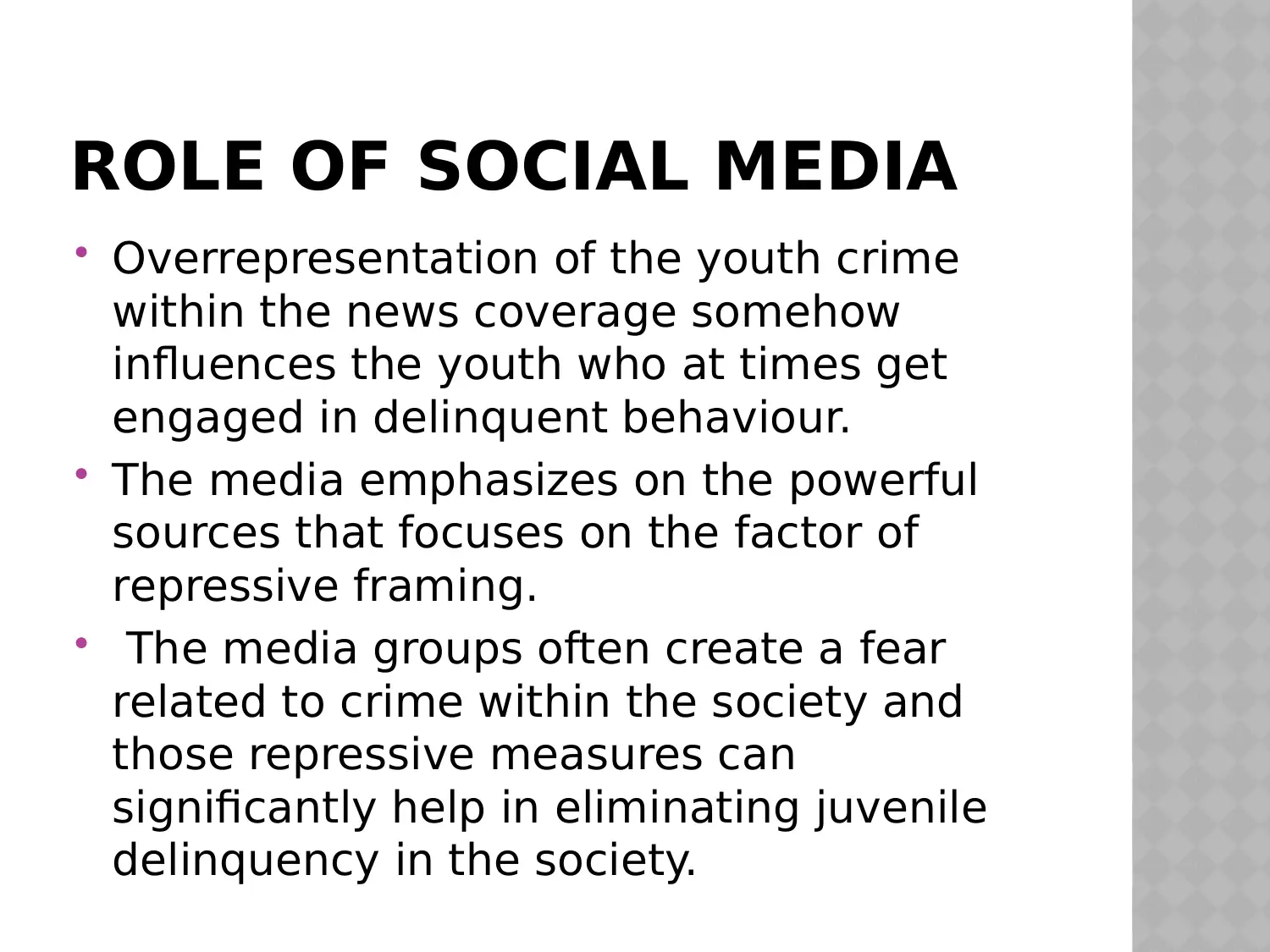
ROLE OF SOCIAL MEDIA
Overrepresentation of the youth crime
within the news coverage somehow
influences the youth who at times get
engaged in delinquent behaviour.
The media emphasizes on the powerful
sources that focuses on the factor of
repressive framing.
The media groups often create a fear
related to crime within the society and
those repressive measures can
significantly help in eliminating juvenile
delinquency in the society.
Overrepresentation of the youth crime
within the news coverage somehow
influences the youth who at times get
engaged in delinquent behaviour.
The media emphasizes on the powerful
sources that focuses on the factor of
repressive framing.
The media groups often create a fear
related to crime within the society and
those repressive measures can
significantly help in eliminating juvenile
delinquency in the society.
⊘ This is a preview!⊘
Do you want full access?
Subscribe today to unlock all pages.

Trusted by 1+ million students worldwide
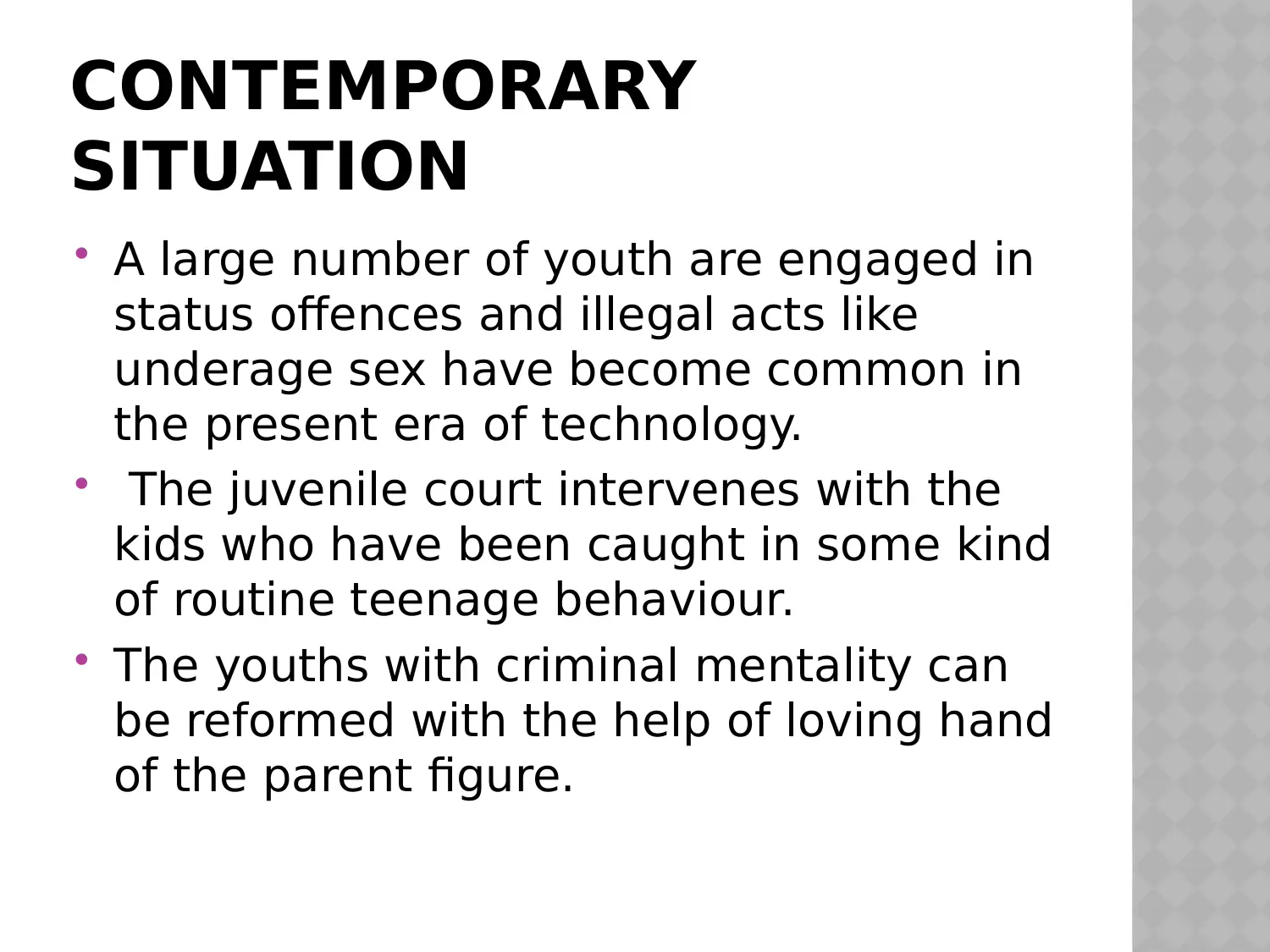
CONTEMPORARY
SITUATION
A large number of youth are engaged in
status offences and illegal acts like
underage sex have become common in
the present era of technology.
The juvenile court intervenes with the
kids who have been caught in some kind
of routine teenage behaviour.
The youths with criminal mentality can
be reformed with the help of loving hand
of the parent figure.
SITUATION
A large number of youth are engaged in
status offences and illegal acts like
underage sex have become common in
the present era of technology.
The juvenile court intervenes with the
kids who have been caught in some kind
of routine teenage behaviour.
The youths with criminal mentality can
be reformed with the help of loving hand
of the parent figure.
Paraphrase This Document
Need a fresh take? Get an instant paraphrase of this document with our AI Paraphraser
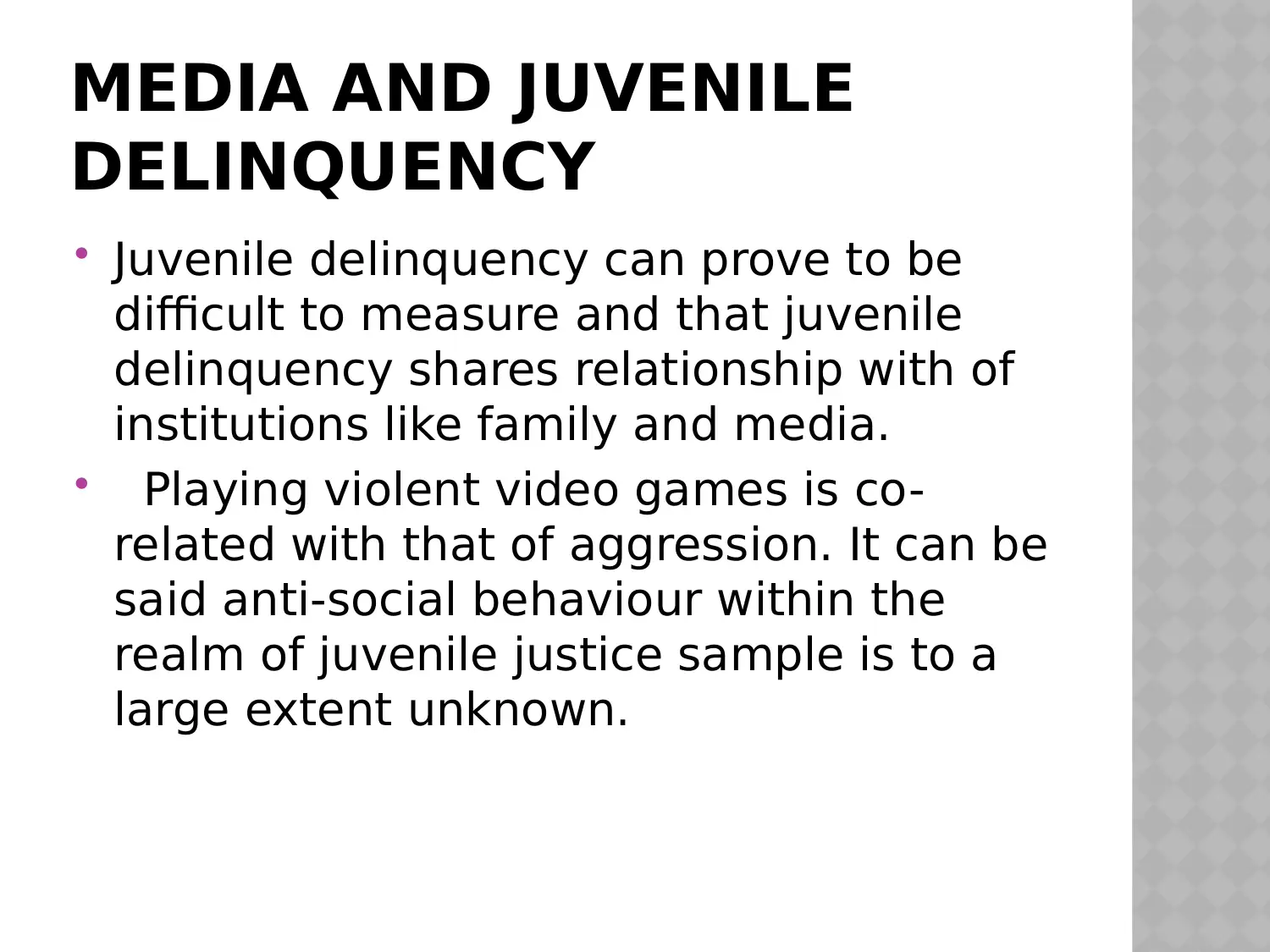
MEDIA AND JUVENILE
DELINQUENCY
Juvenile delinquency can prove to be
difficult to measure and that juvenile
delinquency shares relationship with of
institutions like family and media.
Playing violent video games is co-
related with that of aggression. It can be
said anti-social behaviour within the
realm of juvenile justice sample is to a
large extent unknown.
DELINQUENCY
Juvenile delinquency can prove to be
difficult to measure and that juvenile
delinquency shares relationship with of
institutions like family and media.
Playing violent video games is co-
related with that of aggression. It can be
said anti-social behaviour within the
realm of juvenile justice sample is to a
large extent unknown.
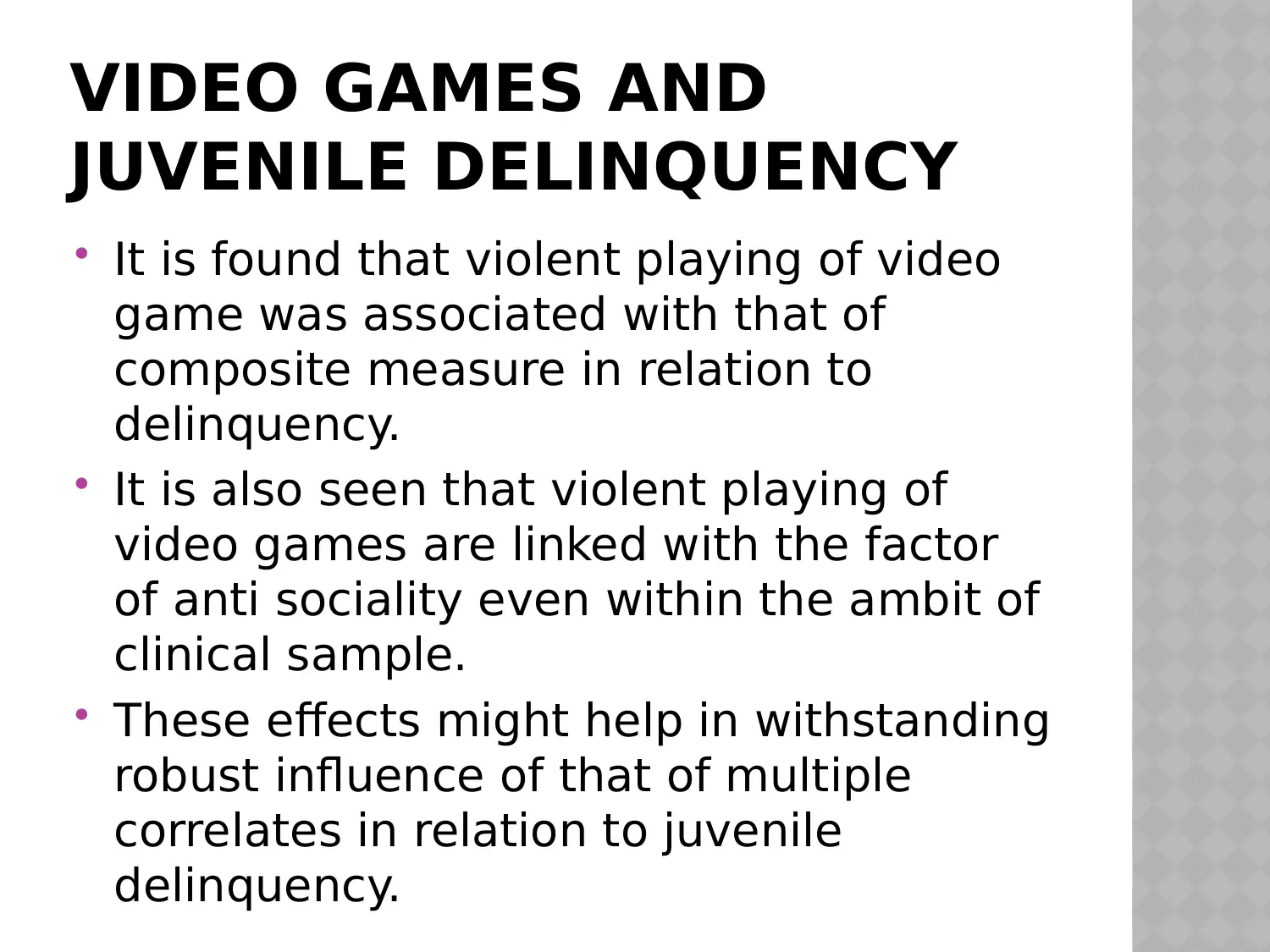
VIDEO GAMES AND
JUVENILE DELINQUENCY
It is found that violent playing of video
game was associated with that of
composite measure in relation to
delinquency.
It is also seen that violent playing of
video games are linked with the factor
of anti sociality even within the ambit of
clinical sample.
These effects might help in withstanding
robust influence of that of multiple
correlates in relation to juvenile
delinquency.
JUVENILE DELINQUENCY
It is found that violent playing of video
game was associated with that of
composite measure in relation to
delinquency.
It is also seen that violent playing of
video games are linked with the factor
of anti sociality even within the ambit of
clinical sample.
These effects might help in withstanding
robust influence of that of multiple
correlates in relation to juvenile
delinquency.
⊘ This is a preview!⊘
Do you want full access?
Subscribe today to unlock all pages.

Trusted by 1+ million students worldwide
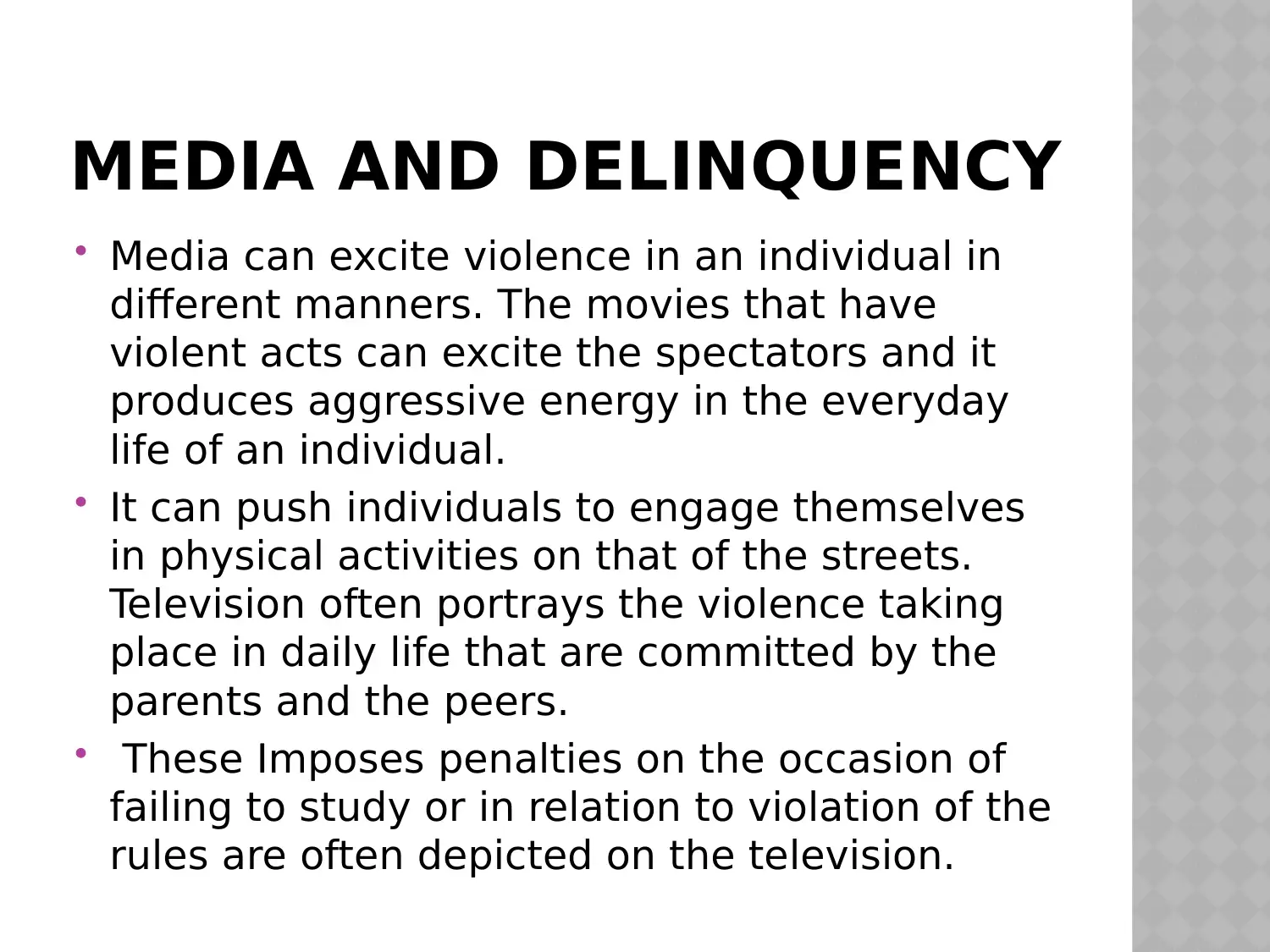
MEDIA AND DELINQUENCY
Media can excite violence in an individual in
different manners. The movies that have
violent acts can excite the spectators and it
produces aggressive energy in the everyday
life of an individual.
It can push individuals to engage themselves
in physical activities on that of the streets.
Television often portrays the violence taking
place in daily life that are committed by the
parents and the peers.
These Imposes penalties on the occasion of
failing to study or in relation to violation of the
rules are often depicted on the television.
Media can excite violence in an individual in
different manners. The movies that have
violent acts can excite the spectators and it
produces aggressive energy in the everyday
life of an individual.
It can push individuals to engage themselves
in physical activities on that of the streets.
Television often portrays the violence taking
place in daily life that are committed by the
parents and the peers.
These Imposes penalties on the occasion of
failing to study or in relation to violation of the
rules are often depicted on the television.
Paraphrase This Document
Need a fresh take? Get an instant paraphrase of this document with our AI Paraphraser
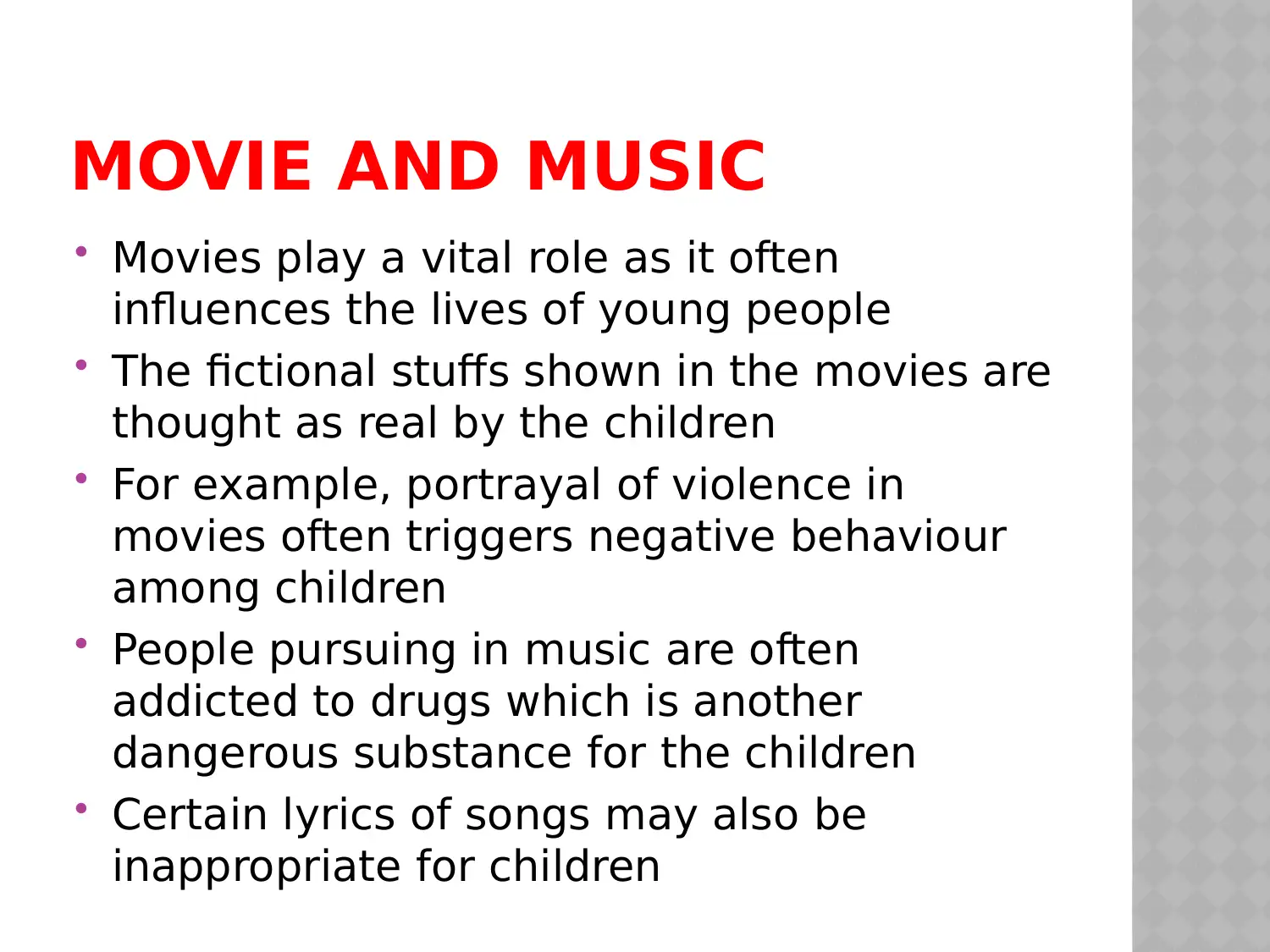
MOVIE AND MUSIC
Movies play a vital role as it often
influences the lives of young people
The fictional stuffs shown in the movies are
thought as real by the children
For example, portrayal of violence in
movies often triggers negative behaviour
among children
People pursuing in music are often
addicted to drugs which is another
dangerous substance for the children
Certain lyrics of songs may also be
inappropriate for children
Movies play a vital role as it often
influences the lives of young people
The fictional stuffs shown in the movies are
thought as real by the children
For example, portrayal of violence in
movies often triggers negative behaviour
among children
People pursuing in music are often
addicted to drugs which is another
dangerous substance for the children
Certain lyrics of songs may also be
inappropriate for children
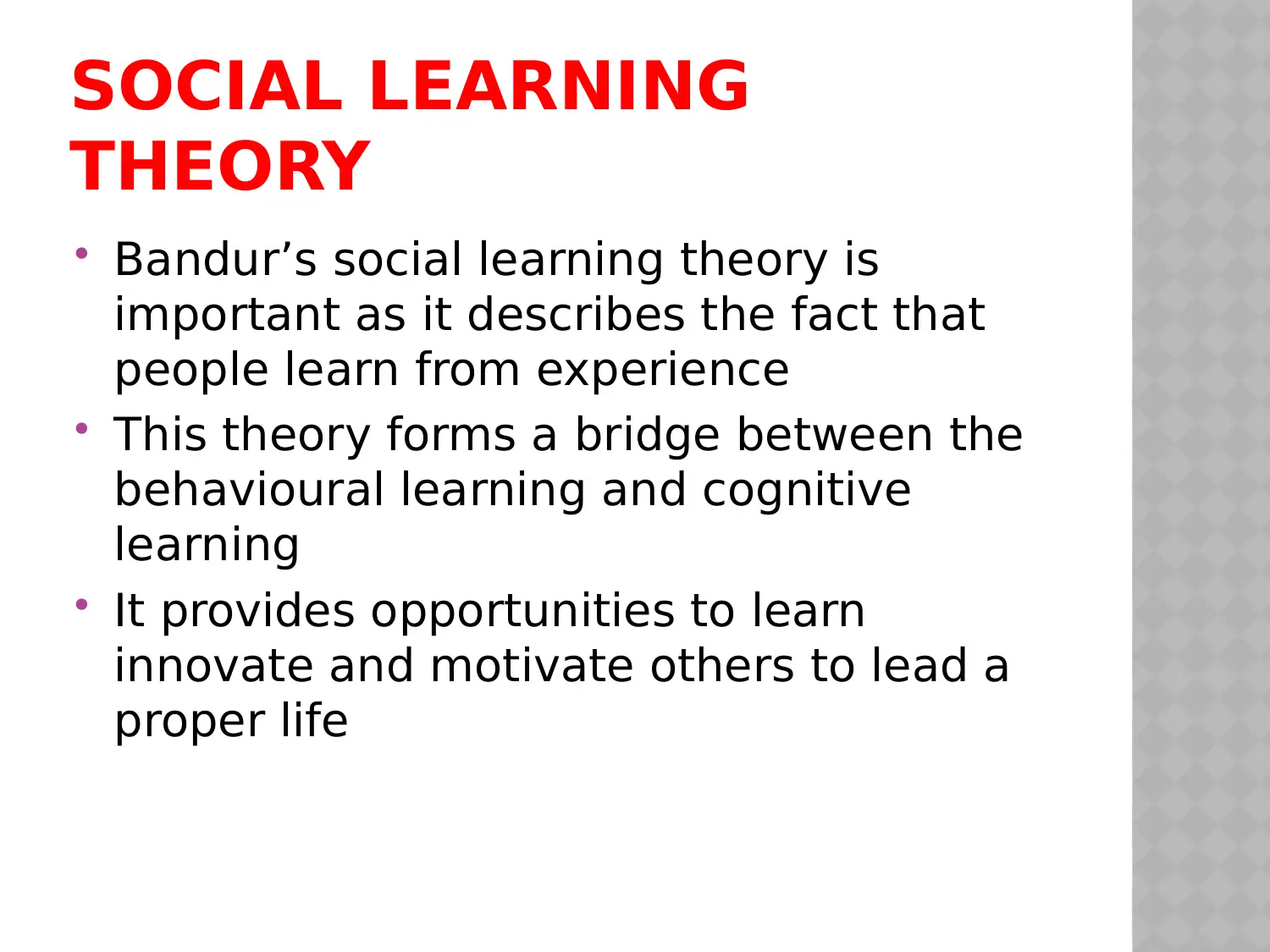
SOCIAL LEARNING
THEORY
Bandur’s social learning theory is
important as it describes the fact that
people learn from experience
This theory forms a bridge between the
behavioural learning and cognitive
learning
It provides opportunities to learn
innovate and motivate others to lead a
proper life
THEORY
Bandur’s social learning theory is
important as it describes the fact that
people learn from experience
This theory forms a bridge between the
behavioural learning and cognitive
learning
It provides opportunities to learn
innovate and motivate others to lead a
proper life
⊘ This is a preview!⊘
Do you want full access?
Subscribe today to unlock all pages.

Trusted by 1+ million students worldwide
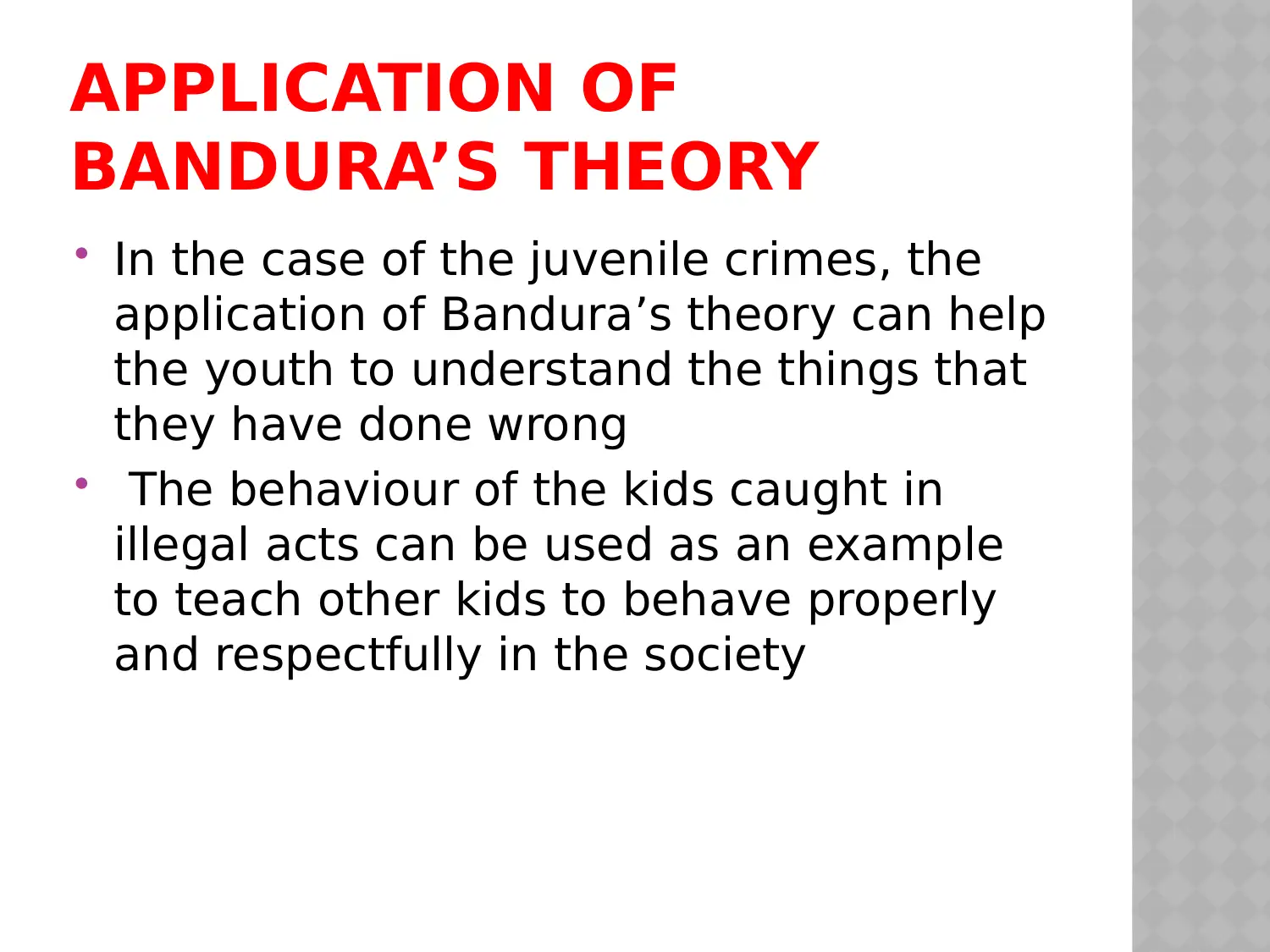
APPLICATION OF
BANDURA’S THEORY
In the case of the juvenile crimes, the
application of Bandura’s theory can help
the youth to understand the things that
they have done wrong
The behaviour of the kids caught in
illegal acts can be used as an example
to teach other kids to behave properly
and respectfully in the society
BANDURA’S THEORY
In the case of the juvenile crimes, the
application of Bandura’s theory can help
the youth to understand the things that
they have done wrong
The behaviour of the kids caught in
illegal acts can be used as an example
to teach other kids to behave properly
and respectfully in the society
Paraphrase This Document
Need a fresh take? Get an instant paraphrase of this document with our AI Paraphraser
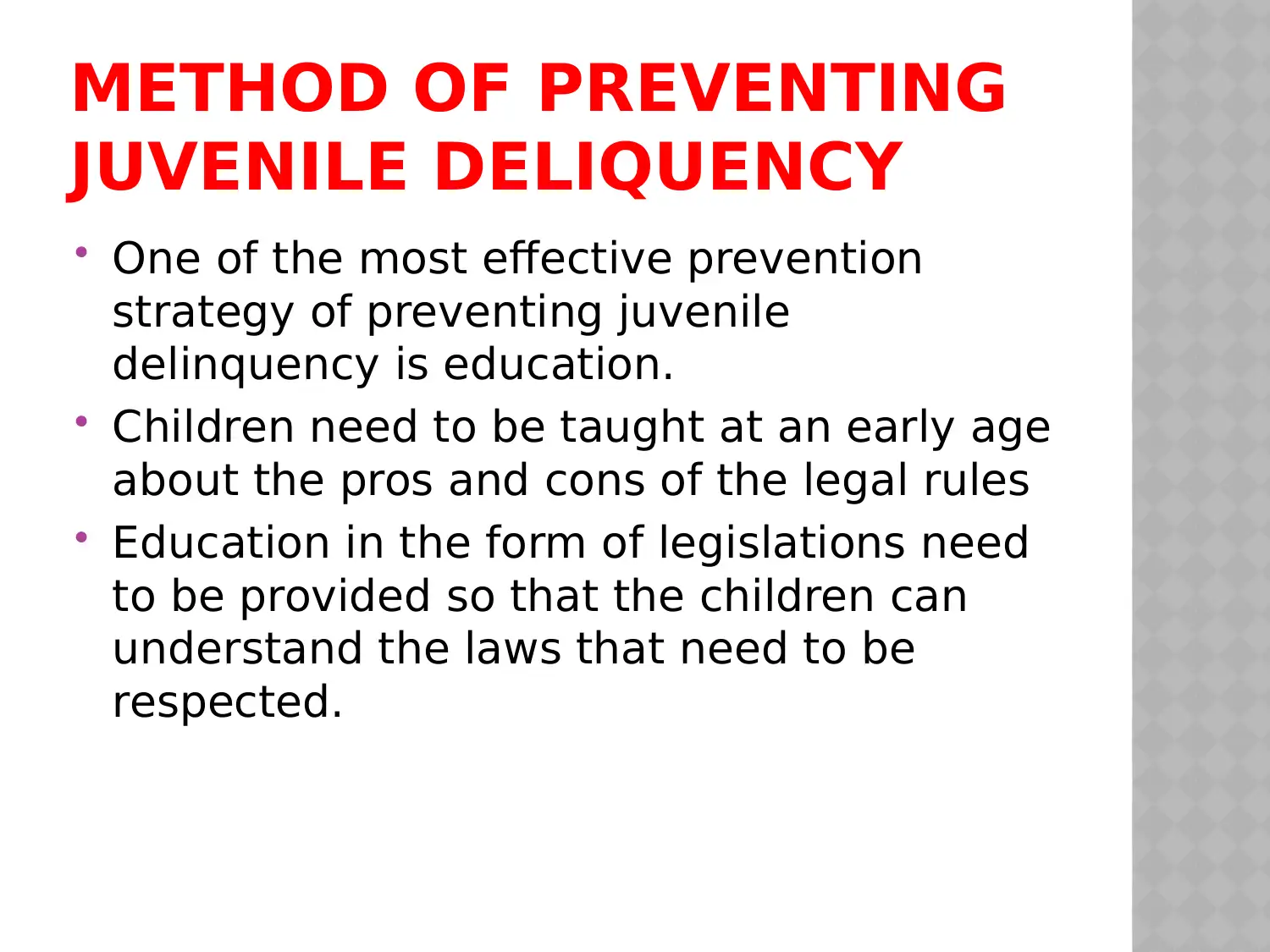
METHOD OF PREVENTING
JUVENILE DELIQUENCY
One of the most effective prevention
strategy of preventing juvenile
delinquency is education.
Children need to be taught at an early age
about the pros and cons of the legal rules
Education in the form of legislations need
to be provided so that the children can
understand the laws that need to be
respected.
JUVENILE DELIQUENCY
One of the most effective prevention
strategy of preventing juvenile
delinquency is education.
Children need to be taught at an early age
about the pros and cons of the legal rules
Education in the form of legislations need
to be provided so that the children can
understand the laws that need to be
respected.
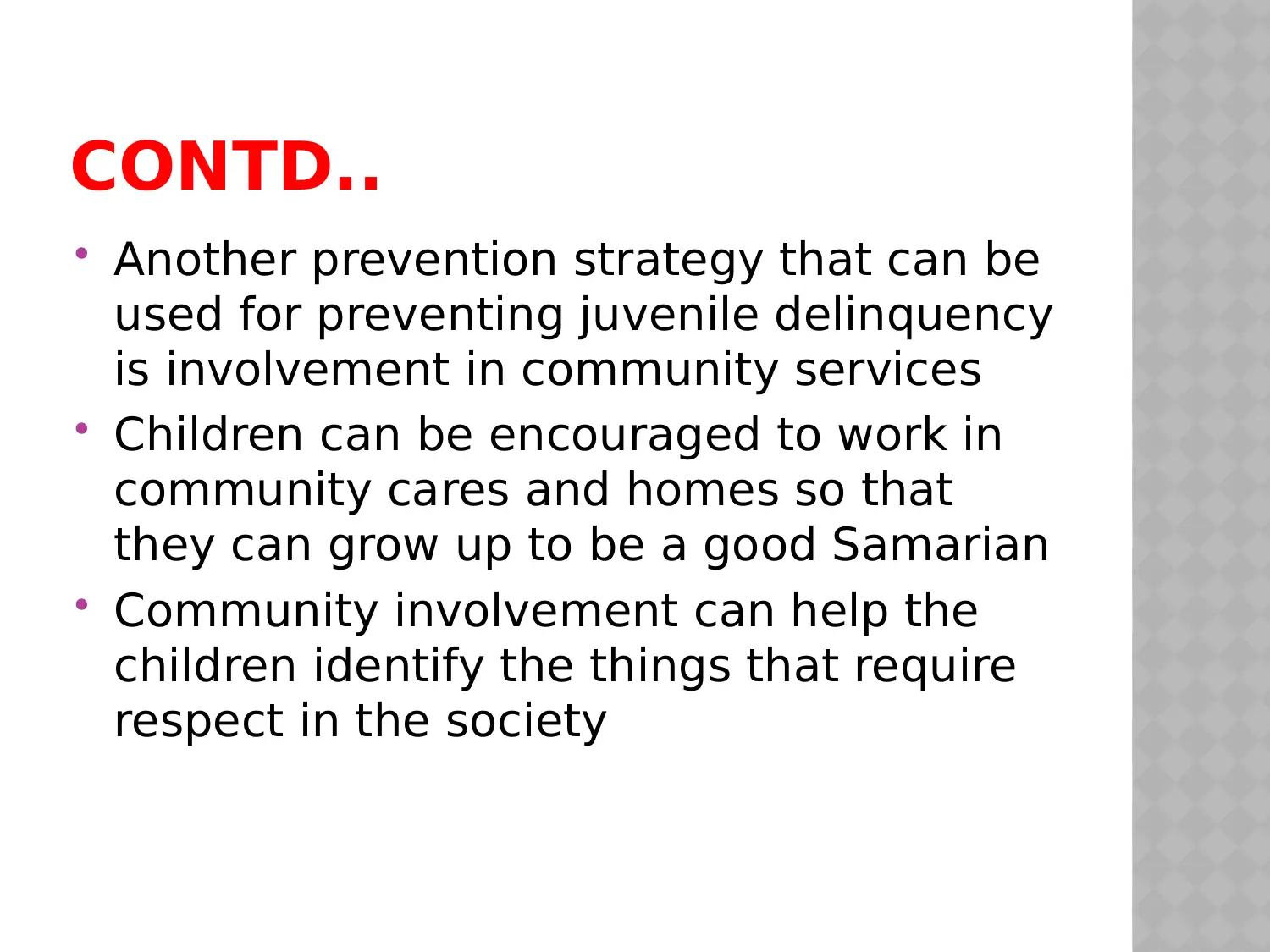
CONTD..
Another prevention strategy that can be
used for preventing juvenile delinquency
is involvement in community services
Children can be encouraged to work in
community cares and homes so that
they can grow up to be a good Samarian
Community involvement can help the
children identify the things that require
respect in the society
Another prevention strategy that can be
used for preventing juvenile delinquency
is involvement in community services
Children can be encouraged to work in
community cares and homes so that
they can grow up to be a good Samarian
Community involvement can help the
children identify the things that require
respect in the society
⊘ This is a preview!⊘
Do you want full access?
Subscribe today to unlock all pages.

Trusted by 1+ million students worldwide
1 out of 17
Related Documents
Your All-in-One AI-Powered Toolkit for Academic Success.
+13062052269
info@desklib.com
Available 24*7 on WhatsApp / Email
![[object Object]](/_next/static/media/star-bottom.7253800d.svg)
Unlock your academic potential
Copyright © 2020–2026 A2Z Services. All Rights Reserved. Developed and managed by ZUCOL.





